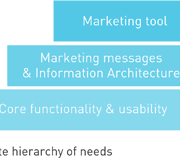How to recruit and train your website
When we begin the web planning process with our clients, we tell them to think of their website as an employee.
Just as you wouldn’t take on a new member of staff without having a defined role for them, so the website needs to have a “job description” from day one. Unless you define what you want from your website, it’s almost impossible to see if it is doing its job properly.
Just like an employee, your site also needs:
To have a line manager
Someone needs to be responsible for the performance of the site, to support it and ensure it is working as well as it can. Managing the site needs to be a defined role, rather than something given to your marketing or IT support team to do in their spare time. The manager needs to understand exactly what the site needs to be doing and be pro-active in helping it do that.
To be a team player
The site needs to work with people across the whole of your business. Although you will have an individual or team directly responsible for the site, it needs to support and be supported by a whole range of people, whether that is the sales team, personnel, management or the shop floor.
To have a training programme
The site needs to grow into its role and with the business. Ensure that as the needs of the business change, the website grows to meet these needs. This means keeping content up to date, but also reviewing functionality as the online world and/or your business changes – for instance supporting Social Media, or mobile web, adding e-commerce etc.
Targets
What do you want the site to do? Set sales targets, or targets for efficiency savings. Perhaps you want it to answer a certain number of questions per month, or generate a certain number of telephone enquiries. Measure and review these targets regularly and if they are not being met, find out why and maybe review the training programme.
A proper recruitment process
Commissioning a website is a major investment for any company – and one that should be treated in the same way, and with the same attention to detail, as taking on a senior member of staff. You need a proper interview process to select the right candidate – establish what the site has to do and ensure that it will be able to do it. What your site needs to be doing – its job description – should be the bedrock on which it is built. Design should always support functionality, never the other way round. Get the interview process wrong, or fail to ask the right questions, and you could have a very expensive time replacing the website you have taken on.
Career development
The most important thing to remember when commissioning a website is that its job only really begins when it is built. You wouldn’t recruit someone and then simply leave them to get on with their job without accountability. Similarly, you need to use analytics, user feedback, targets etc to monitor the work your site is doing. When it meets targets, set it new ones. When it proves it is paying for itself, invest more in it.
A salary
You should set a budget for ongoing support, hosting and maintenance of the site. Be realistic in what you expect to pay. Just as you can get free hosting, you can also recruit a head of department on minimum wage. But in both cases, you’d probably get what you paid for.
Regular appraisals
As well as reviewing stats and targets, get feedback from the website’s “co-workers” – the people in your business who deal with the site directly or indirectly (and that should mean all of them). How easy do they find the site to work with? How is the site helping them? What could it do better? And remember, just like an employee, not everyone will always like or get on with your website – so get a balanced picture before deciding to make any changes.
In summary
Ensuring a website performs at its best needs ongoing investment in terms of time and money, just as employing a member of staff does. When you get it right both pay for themselves many times over. When you get it wrong, it can be a very costly mistake.
By thinking about your website as an employee, you can help ensure that more often than not you get it right.


Leave a Reply
Want to join the discussion?Feel free to contribute!